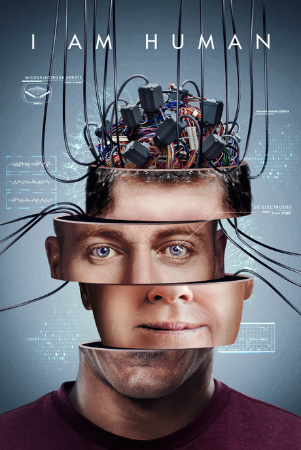
I Am Human 2019
Distributed by Passion River Films, 154 Mt. Bethel Rd., Warren, NJ 07059; 732-321-0711
Produced by Geoff Clark, Alex Klokus, Jeremy Chilnick, Cody Rogowski, Taryn Southern, and Elena Gaby
Directed by Taryn Southern and Elena Gaby
Streaming, 91 mins
College - General Adult
Bioethics; Computer Industry; Neurosciences
Date Entered: 08/04/2020
Reviewed by Kathleen H. Flynn, Science Librarian, University at AlbanyThe film I Am Human concludes with a claim by experts that over a million people will have implanted brain interfaces within a decade. Possible uses for these brain interfaces include improving the motor functions of people with spinal cord injuries, improving the senses, helping those with mental illness, learning a new skill, understanding someone else’s emotions or thoughts, increasing one’s intelligence or ambition, and more.
Although this technology is in its infancy, it has already begun to be used in human patients. Three patient’s stories are told throughout the film: a tetraplegic man, a woman with Parkinson’s disease, and a visually impaired man. They each receive a slightly different treatment, but all involve using electrodes to stimulate and manipulate the brain.
The viewers get a glimpse of each patient’s quality of life, hopes, fears, successes, and setbacks. It is frequently moving to hear the motivations of the patients and watch with anticipation as they attempt to use the technology post-surgery.
The production of the film is excellent. The speakers interviewed consist of biomedical engineers, a neurotech entrepreneur, a sci-fi writer, neuroscientists, and physicians. The film discusses and shows the science behind the technology at a level that will be engaging for those in the field but not overwhelming for laymen. The high costs associated with this research are also mentioned. Towards the end of the film, the tone becomes philosophical and the issue of ethics is broached. As the title of the film alludes, can those who receive these treatments or enhancements now or in the future be considered fully human? How will the security and privacy of the devices be managed? Will everyone have access to this technology?
This film would educate as well as inspire debate and discussion among viewers. It is strongly recommended for courses in engineering, computer science, biology, the health sciences, or philosophy.
Awards:
Audience Choice Best Feature Eastern Oregon Film Festival; Best of the Best El Dorado Film Festival; Best Director Oslo Independent Film Festival; Audience Choice Best Sci-Fi Feature Other Worlds Festival; Outstanding First Feature Tallgrass Film Festival